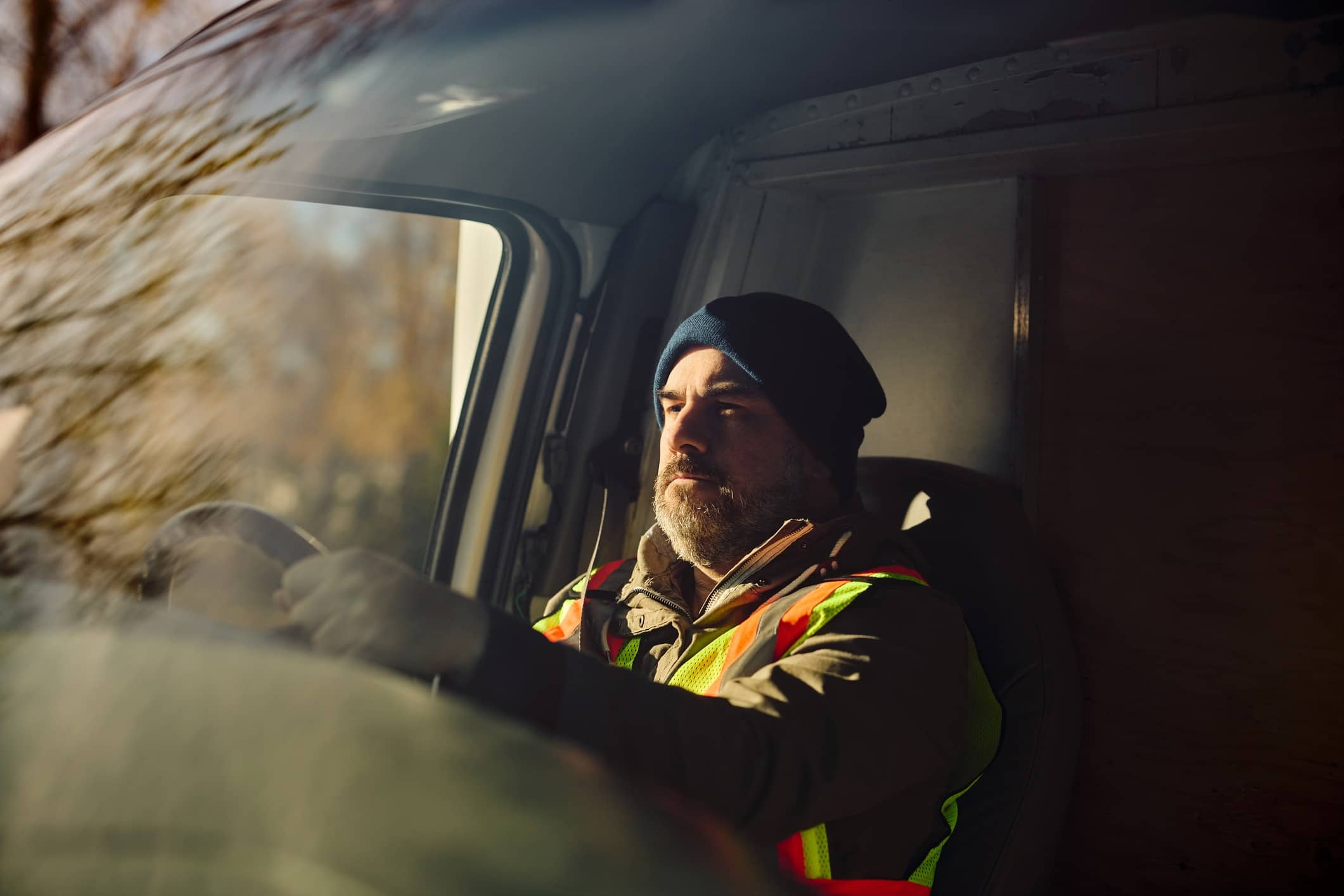The Cost Of Traffic For Tradespeople In Ireland
How Traffic is Hurting Tradespeople’s Earnings

Tradespeople across Ireland are losing valuable income simply by sitting in traffic. In a job where time is truly money, traffic delays are more than a nuisance; they’re a costly obstacle to revenue. On average, tradespeople spend over five hours each week stuck in traffic, but how much is this really costing them?
To find out, we surveyed 500 tradespeople in Ireland who use a van as their main form of transport for work. The research sheds light on the financial impact of these roadblocks for tradespeople in Ireland, revealing the industries hit hardest, the regions with the biggest losses, and the ways travel time affects business choices for those who rely on transport.
How long are tradespeople in Ireland stuck in traffic each week?
Traffic delays can have a substantial impact on tradespeople’s earnings, as time lost in transit is time unavailable for completing paid work. In industries where tradespeople rely heavily on mobility, delays can mean big financial losses.
Overall, tradespeople in Ireland spend about six hours travelling to and from work each week. Just over five of those hours are spent in traffic —hours that could otherwise generate income. To put this into perspective, that’s around 86% of their weekly journey stuck behind another car’s brake lights.
The trades that travel the longest each week
The distance travelled by tradespeople with a van to and from work might vary depending on several factors: how far they are travelling, how often they are travelling, and how many jobs they carry out in one day.
Travelling to and from jobs for a bricklayer might look very different to that of an electrician. So, which field of work is in their vans for the longest?
| Rank | Industry | Avg. time spent travelling to and from work in a week | Avg. time spent in traffic in one week | % of weekly travel time spent in traffic |
|---|---|---|---|---|
| 1 | Bricklaying | 7h | 6h 35m | 94% |
| 2 | Electrics | 7h | 5h 54m | 85% |
| 3 | Gas and Boiler | 6h 44m | 5h 54m | 88% |
| 4 | Carpentry | 6h 4m | 5h 16m | 87% |
| 5 | General Maintenance | 5h 50m | 4h 56m | 85% |
| 6 | Landscaping/Groundwork | 5h 44m | 4h 51m | 85% |
| 7 | Painting and Decorating | 5h 10m | 4h 19m | 83% |
| 8 | Plumbing | 5h 2m | 4h 38m | 92% |
| 9 | Plastering | 3h 51m | 3h 2m | 79% |
Bricklayers and electricians spend the most time on the road, averaging about 7 hours each week. This means they also deal with a lot of traffic, with around 6 hours 35 minutes stuck behind the wheel for bricklayers and 5 hours 54 minutes for electricians.
Both often have to work at different locations like homes, commercial buildings, and other projects, which requires frequent travel between job sites. Bricklayers also need to carry heavy materials to job sites, while electricians need to transport their tools and equipment. This leads to extra trips to pick up supplies, contributing to their long hours on the road.
Those in the gas and boiler industry are a close second, at 6 hours 44 minutes on the road, with 5 hours 54 minutes spent in traffic. Plasterers are travelling the least, at 3 hours 51 minutes on the road, around three of which is spent in traffic.
The industries losing the most money due to traffic
With so much time spent in the car, traffic delays are having a serious impact on income—especially for self-employed tradespeople who rely on every hour worked to earn a living. For many in these trades, time lost on the road directly translates to lost earnings.
Considering that the mean hourly rate for all tradespeople in Ireland is €26.21, we’ve calculated that the average tradesperson loses around €137 weekly to time spent in traffic. That amounts to around €7,000 a year – so traffic might be more costly than we ever thought.
So, among all the specialties in trade, which industries are impacted the most? We looked at each industry’s mean hourly rate and the amount of time they spend in traffic whilst travelling to and from work each week. Using these figures, we calculated how much money tradespeople lose to traffic each week, month and year.
| Industry | Avg. hours spent commuting weekly | Avg. hours spent in traffic weekly | Avg. weekly loss | Avg. full days lost yearly | Avg. yearly loss |
|---|---|---|---|---|---|
| Gas and Boiler | 6h 44m | 5h 54m | €157 | 13 | €8,158 |
| Bricklaying | 7h | 6h 35m | €156 | 14 | €8,130 |
| Electrics | 7h | 5h 54m | €152 | 13 | €7,893 |
| Landscaping/Groundwork | 5h 44m | 4h 51m | €138 | 11 | €7,174 |
The gas and boiler services industry is one of the hardest hit financially by traffic delays. Tradespeople in this sector rely on travelling to and from customers' homes to complete jobs and earn income. On average, workers in this field spend approximately 6 hours and 44 minutes travelling each day, with a staggering 88% of that time lost in traffic. Over the course of a year, this equates to 13 full workdays—nearly two weeks of potential earnings gone. But what does this really cost them?
Based on an average hourly charging rate of around €26.21 per hour, it costs people who work in this industry an average of €157 weekly in time, resulting in a monthly loss of €628 and a staggering annual loss of €8,158, more than any other trade analysed.
Bricklayers are not far behind, spending the most time in traffic compared to any other trade. They’re stuck for nearly seven hours each week—about 94% of their commuting time—which translates to almost an entire workday lost every week. With an average hourly rate of €24, this results in a weekly loss of €156, adding up to an unbelievable €8,130 annually. Electricians also face substantial delays, losing around €152 each week, which totals €7,893 per year.
In comparison, other sectors like landscaping, general maintenance, and painting and decorating experience relatively lower—but still notable—losses, ranging from €7,174 to €6,220 annually. Even at the lower end of the scale, industries like plastering incur annual losses of €4,457, highlighting the widespread economic impact of traffic delays across trades.
The regions losing the most money to traffic
Traffic congestion isn’t just a headache; it’s also costing certain regions a significant amount of money, and some more than others. Below are the areas in Ireland that are taking the biggest hit from time spent in traffic, along with the average amounts lost weekly, monthly, and yearly based on the average salary of all tradespeople.
| Region | Avg. hours spent in traffic during the week | Avg. amount lost in a week (€) | Avg. hours spent in traffic during a year | Avg. amount lost in a year (€) |
|---|---|---|---|---|
| Waterford | 6 hours, 22 minutes | €177 | 331 hours | €9,202 |
| Cork | 5 hours, 57 minutes | €157 | 310 hours | €8,144 |
| Dublin | 5 hours, 2 minutes | €135 | 278 hours | €7,039 |
| Galway | 4 hours, 55 minutes | €132 | 256 hours | €6,848 |
| Limerick | 4 hours, 47 minutes | €126 | 248 hours | €6,527 |
Ireland’s traffic levels hit wallets hardest in Waterford, where drivers are spending six hours and 22 minutes stuck in traffic travelling to and from work in an average week. Over the course of a year, that adds up to a staggering 331 hours – that’s two whole weeks of work missed out on. Because of this, tradespeople in Waterford are sacrificing €177 each week—adding up to a massive €9,202 in losses each year.
Cork follows, with local tradespeople in traffic for almost six hours in the average week, adding up to around 310 hours lost, or 13 days, per year. Tradespeople are sacrificing €157 each week as a result, or €8,144 annually. Even Dublin can’t escape the gridlock, costing drivers €135 per week and stacking up to €7,039 each year.
Galway and Limerick aren’t far behind, with their drivers dropping small fortunes in delays. With such staggering losses, one thing’s clear: traffic in these regions is preventing tradespeople from earning a lot of profit.
How is traffic affecting tradespeople in Ireland?
Based on our findings, we wanted to find out if tradespeople were changing their behaviours due to traffic being such a problem.
We found that tradespeople turn down an average of five jobs a month due to traffic or travel time, which amounts to a whopping 60 jobs a year. Some of our respondents even said they turn down nine to ten jobs a month because of traffic, the highest being tradespeople working in the general maintenance sector.
Over one third said they have turned down a job due to it requiring them to travel through a high-traffic area, and a further 38% said they have turned down a job due to the amount of time it would take them to travel there. A substantial 41% said they would be able to earn more money if traffic was less of an issue, understandable considering much of their time is spent behind the wheel.
Interestingly, around half (49.4%) of those who work in electrics said they would be able to earn more money if traffic wasn’t an issue, and 50% of carpenters reported that they have previously turned down a job due to the amount of time it would take them to travel there.
How does rising traffic levels contribute to increased vehicle insurance costs?
As traffic congestion intensifies, so does the frequency of minor accidents, wear on vehicle parts, and instances of road rage—factors that all increase van insurance costs. Ian O’Reilly at Chill explains why this happens, and how this can be reduced in the future:
“Heavier traffic means more frequent braking, increased engine idling, and accelerated tire and brake pad wear. This wear and tear not only means more regular vehicle maintenance but also increases the likelihood of breakdowns that can cause more accidents and claims.
“Traffic congestion also creates heightened driver stress, which can lead to aggressive driving behaviours like speeding and tailgating. Stress-induced behaviours can result in a higher likelihood of collisions, and therefore, more claims. Studies indicate that there is a correlation between road rage incidents and congestion levels, adding a substantial factor to risk assessment models used by insurance companies.
“On a more positive note, innovations and personal changes when driving are showing promise in changing these issues. Vehicle manufacturers are incorporating advanced driver assistance systems (ADAS) like automatic emergency braking and lane-keeping assistance, which can reduce the likelihood of accidents in congested conditions. Plus, promoting safe-driving habits and community-based awareness campaigns can help drivers to manage stress and reduce risky behaviours in traffic.
“We can play a crucial role in educating drivers on reducing their van insurance costs by encouraging smoother driving habits and supporting technologies that help them avoid collisions.”
Methodology
A survey of 500 (ROI) tradespeople in Ireland who use a van as their main form of transport whilst working (aged 17+) was conducted in October 2024.

